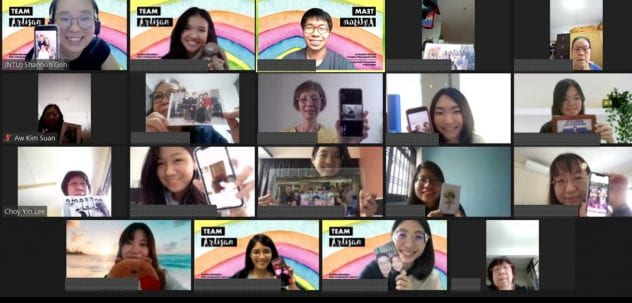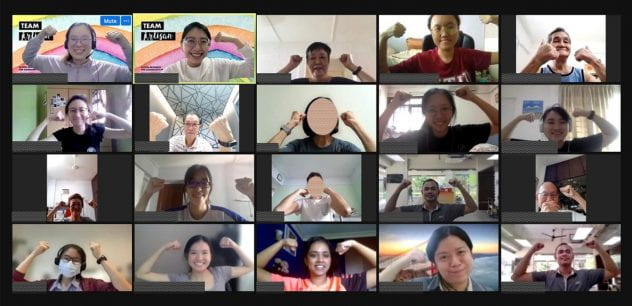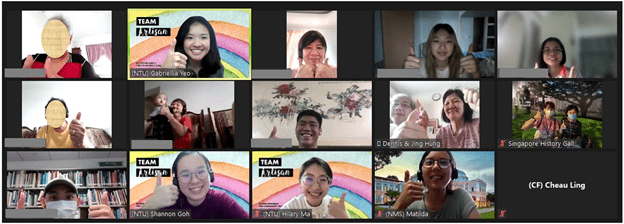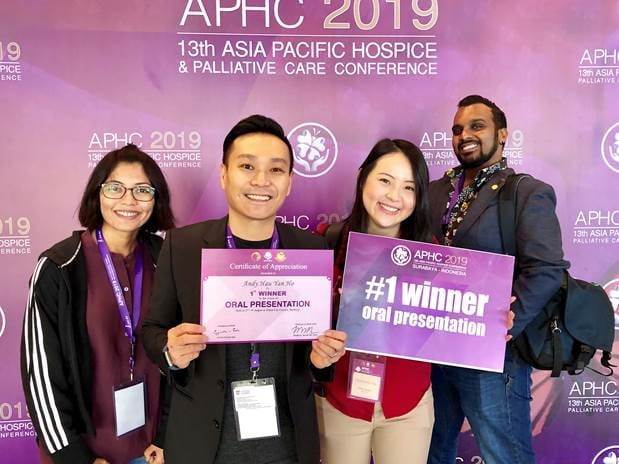ARTISAN 2.0 (July 2021): Virtually Connecting Youths and Seniors in the Midst of a Raging Pandemic
ARTISAN (Aspiration and Resilience Through Intergenerational Storytelling and Art-based Narratives) was developed by Associate Professor Andy Ho with his PhD student Ms. Stephanie Hilary Ma of the Action for Community Health (ARCH) Laboratory at the School of Social Sciences of Nanyang Technological University (NTU), in partnership with National Arts Council, the National Museum of Singapore, TOUCH Community Services and Care Community Services Society. The aims of ARTISAN are to alleviate loneliness, cultivate resilience and build social connectedness among the young and the old through a holistic and multimodal intervention framework that combines the 3 distinctive elements of 1) participatory arts; 2) facilitated storytelling, and 3) curated arts spaces.
From our pilot study in 2018, the research team found that both senior and youth participants experienced significant increase in life satisfaction and resilience, as well as decreased loneliness. ARTISAN, with its intricately designed art and heritage program was able to connect participants’ individual stories with the national stories of Singapore to forge a deepened national identity and a stronger sense of unity under the skylights of the museum space.
Following the successful outcomes of the pilot study, the team sought to better understand the mechanisms underlying ARTISAN’s integrative framework, as well as the interplay between different intervention components including intergenerational storytelling, creative art-making and curated museum tours. As such, ARTISAN 2.0 (Deconstructing the Integrative Efficacy of a Multimodal Art-based Intervention to Strengthen Understanding and Demystify Misconception on Arts Heritage and Health) was conceived.
ARTISAN 2.0 involves a research study that test the effectiveness of holistic health promotion among 5 intervention conditions including (1) the full ARTISAN programme; (2) Intergenerational Artmaking; (3) Intergenerational Museum Tours; (4) Intergenerational Storytelling; and (5) Intergenerational Exercise. While the programmes were designed to be run in-person, it was translated onto an online platform for the safety of all due to the COVID-19 pandemic. With strong partnership amongst all stakeholders, a virtual implementation of ARTISAN 2.0 was developed, encouraging creative and active engagements from the comfort of the participant’s homes.
In July this year, 140 youth and seniors were paired and collectively embarked on a 5-week virtual adventure while improving their holistic health over various activities. The pairs enjoyed the activities as a group on Zoom and forged deeper intergenerational relationships in breakout rooms. Participants in the physical exercise group worked up a sweat virtually through intergenerational aerobic exercises led by a skilled physical trainer. Those in the intergenerational art-making programme explored a myriad of visual art mediums with their partner, an enthralling experience of creative expression led by a local artist. Youth and seniors in the intergenerational museum tours discovered Singapore’s artefacts and unique history through interactive virtual tours of the galleries, live streamed from the National Museum of Singapore. In the intergenerational storytelling group, participants shared their life experiences and wisdom with each other, and were transported to various times in their partner’s lives. Participants in the ARTISAN group experienced an intricate combination of curated live streamed museum tours, professionally led art making and a guided narrative experience, based on the empirically based ARTISAN framework themes of discovering their national heritage, building lasting social bonds, reflecting upon resilience while overcoming adversities and collectively building dreams and aspirations for their future.
After five weeks of engaging in the various programmes offered in the ARTISAN 2.0 study, participants experienced positive life changes such as confidence to learn new skills, greater zest for life, and strengthened relations with others. An 18-year-old female participant shared that the ARTISAN “programme gave (her) a lot of positive interactions, and (she) really enjoyed listening to the big group sharing. It was very enjoyable for (her) as it was like a stress reliever. (She) was generally happier throughout the five weeks, and (she) was engaging (her) family in conversation more (often) as well.” Similarly, a 69-year-old male participant “realised that if (he was) able to communicate with the (youth) participants during the five weeks, why can’t (he) communicate with (his) grandchildren? This programme encouraged (him) to open up to his grandchildren.”.
Participants also observed improvements in their wellbeing and quality of life after completing the ARTISAN 2.0 programmes. One 30-year-old female participant explained that she was “diagnosed with insomnia but realised that these five weeks (of attending ARTISAN) have been so good, (she) had no troubles sleeping (at all).” In terms of psychological health, a 76-year-old female participant shared that “(her) mood has been better, and (she) has less frustrations” and the programme made another 70-year-old participant “feel like (she) has become younger at heart”.
For some older participants, joining an online programme may seem challenging to navigate. Over time, with weekly practice, the support provided by facilitators and fellow participants as well as a willingness to learn, many were able to independently enjoy the activities on zoom. A 68-year-old lady mentioned that “during the first and second week, (she) needed guidance from (her) grandchild. At the end of the programme, (she) can log into Zoom by herself.” Initially, some youth participants were also worried about engaging with seniors on an online platform, however, their concerns were eased as they found the online platform and the ARTISAN programme to be “a very comfortable space, it was very easy for (them) to engage with the seniors, and it didn’t really feel like (the seniors) were from a different generation, it felt more like we were friends talking and hanging out (18-year-old, female)”
During these unprecedented times where physical distancing and staying home remains the default, the ARTISAN 2.0 study showed that virtual arts and heritage intergenerational group-based interventions have vast potential to empower and forge meaningful relationships among youths and seniors, bringing them closer together in healing loneliness. July 2021 was fraught with uncertainty and challenges for many in Singapore, nonetheless, it was an eventful journey for all who were involved in ARTISAN 2.0, fostering a narrative of renewed strength and shared humanity.

Image 1: Holding up emblems and pictures of loved ones to start off a wonderful morning of sharing life’s best moments, exchanging stories and wisdom for participants in the storytelling group

Image 2: Participants in the physical activity group showing their strength after a virtual morning workout together
 Image 3: Participants in the museum tour groups giving a big thumbs up to thank our museum tour docents for their engaging and wonderful tours.
Image 3: Participants in the museum tour groups giving a big thumbs up to thank our museum tour docents for their engaging and wonderful tours.

Image 4: Fancy some kueh-kueh? Participants in the art-making group sharing clay models of their favourite foods.

Image 5: Participants may be tuning in remotely, but that does not stop them from creating art together. “Our Future Singapore” is a digital collage of the participant’s collective dreams and aspirations for Singapore.



 Image 3: Participants in the museum tour groups giving a big thumbs up to thank our museum tour docents for their engaging and wonderful tours.
Image 3: Participants in the museum tour groups giving a big thumbs up to thank our museum tour docents for their engaging and wonderful tours. 








